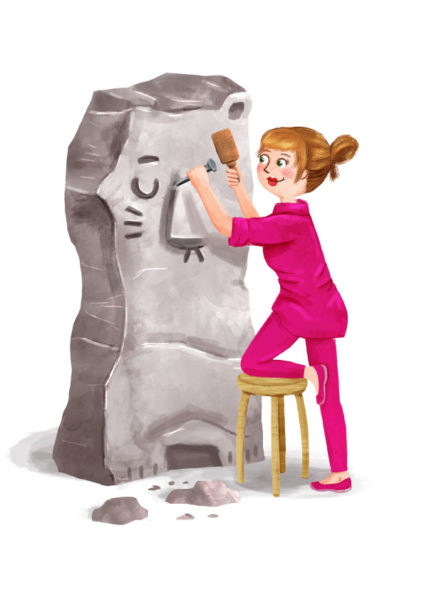WHAT IS FLY FIVE WHAT YOU’LL RECEIVE GETTING STARTED ASSESSMENT SUITE PROFESSIONAL DEVELOPMENT
Creators live in the moment and let their impulses push or pull them in their desired direction. They are motivated by spontaneity, their emotions, and lively collaboration to achieve their goals. The Adventurer in them sees opportunity anywhere and will let a fleeting idea reshape their path of travel. This is not because they are easily distracted, but because they firmly believe in the value and veracity of their instincts. The Insulator in them keeps Creators grounded in their work and focused on prioritizing their goals over idle socializing or overanalyzing what the past or future may hold.
 |
 |
Steady yet spontaneous individuals who keep themselves and a group on track. Learn more... As a member of the Creator family, a Drummer can keep themselves and a group on track. They motivate themselves to keep a steady work ethic and will test out multiple options before making a choice. A Drummer relies not only on their intuition to complete a goal but also on their ability to anticipate where things may go off track. Although a Drummer is a direct communicator and skilled at respecting different opinions, they generally would rather complete the task before building relationships with group members. If they are socializing with a group, it is likely relevant to the work that needs to be done. A Drummer tends to make decisions in the moment and prefers to push boundaries when working toward their goals, often overlooking their past methods of success to try something new. Their willingness to follow their instincts and step outside of widely held conventions makes a Drummer excited to take on new challenges, even when their spontaneous decision-making process may lead to unanticipated consequences. Despite focusing more on the work and less on the relationships with the group, a Drummer understands that asking for help may be necessary to reach their goals. They will seek the support of others in the group to help them manage their emotions and persist when it gets tough; they can modify their behavior if something isn’t working without being told how to and can remain productive. Overarching Tip: Notice your inner monologue after a challenge or failure. Showing hope and persisting is a facet of self-control, so it’s important that we speak to ourselves constructively and positively. If you find yourself in a negative thought loop after something doesn’t go your way, reframe to think about what went well, what could have gone better, and how you’ll adjust for next time. Mindfulness Tip: You trust your instincts and, as a Drummer, you’re likely quick to take on new projects or throw your energy into exploring your impulses. What happens if you take a breath and slow down? Time will continue passing even if you don’t move so quickly to get to the future. When slowing down causes discomfort, take mindful breaths. Let your ideas and impulses have space to grow and change, and see how your ideas have shifted after some downtime. Competency Tip: Connect your abilities with action steps to help you finish a task or reach a goal. If you think of yourself as creative, write out three ways that creativity can be operationalized. Leveraging your strengths and abilities makes working toward your objectives more engaging and will likely lead to a positive outcome. |
Focused, considerate, and self-reliant minds tirelessly seeking knowledge. Learn more... A Professor is a member of the Creator family. They tend to be thoughtful and considerate while following their intuition in their quest for the knowledge necessary to reach their goals. They strike a balance between spontaneous and measured decision-making when working toward a goal, following their impulses while focusing intently on what they can do independently to find success. They try to rely on themselves to make ethical choices, although they may act without considering every possible consequence and need someone else to remind them of a constructive alternative option. A Professor is skilled at analyzing and assessing their emotions as well as the emotions of others, and they routinely respect and value the differences other people can bring to the table when working in a group. A Professor typically prefers to focus on accomplishing a goal over establishing or maintaining relationships, often pursuing their goals independently and without asking for help. They value direct communication, as long as it isn’t just socializing but is relevant to the work that needs to be done. A Professor may sometimes overthink situations and withhold their input for fear of hurting someone’s feelings but is generally helpful and skilled at integrating group feedback into their work. They are results-oriented, as they define themselves by their current successes or failures and hold themselves to high standards of responsibility and self-awareness when working toward a goal. Overarching Tip: Practice using “I feel . . .” statements. When you’re feeling overwhelmed by an emotion like anger, fear, or disgust, communicate your emotions as “I feel . . .” to effectively get the message across without becoming aggressive or accusatory. These statements help keep communication channels open and set constructive boundaries. Mindfulness Tip: As a Professor, don’t lose sight of the vast world that exists outside of your own. When do your thoughts start to feel like the only reality? Close your eyes for a minute, and notice how it feels to look around when you open them back up. Practice mindfulness to do a reality check. Notice if your expectations are aligned with what’s really happening. Competency Tip: When cooperating with others, keep your focus on the greater good. Whether you’re a leader or in the ensemble, every role is important. Take the time to find what matters about what you’re doing, and contribute wholeheartedly. You never know what the future holds and what this role may grow into. Build alliances with others whom you can help and who can help you in return. |
 |
 |
Self-aware, confident spirits who follow their impulses and are undaunted by new endeavors . Learn more... A Guitarist—a member of the Creator family—tends to follow their impulses in the moment to see where they lead. They tend to align themselves with similar individuals and find they can best create harmonious work when they share a connection with someone. A Guitarist has a strong understanding of their emotions and behaviors and prioritizes achieving a goal over establishing relationships with the group. They tend to follow their intuition and will motivate themselves to take chances while still being accountable for their actions. Their self-awareness provides them confidence to push the boundaries of widely held moral conventions, which they tend to view as suggestions rather than rules. A Guitarist does not determine their identity based on present conditions, and they typically embrace new endeavors undaunted. If they are having trouble navigating challenges that arise along the way, a Guitarist will enlist others for support with persisting. Sometimes their spontaneous tendencies when making decisions may lead to unforeseen consequences, but a Guitarist abides by their internal ethical code and will change their actions accordingly. They will ask for help if they need it, but will generally lean toward recognizing the ideas of those who are similar to them and tend to communicate in service of completing their goals.Overarching Tip: Focus on finding common ground when working with others. If you find yourself in a thought loop of what isn’t working, practice inverting it. See what changes when you focus on what is working; build on that.
Mindfulness Tip: As a Guitarist, your strong moral compass allows you to make ethical decisions. Is it possible you’re too hard on yourself because of it? Remember that everyone makes mistakes. Practice mindfulness to suspend judgment about yourself. Focus on acknowledging the discomfort that a misstep can cause, but trust yourself to learn from it. Carrying judgments weighs you down—let go. Move on lighter and with more space to learn. Competency Tip: Notice when you’re replaying the same situation in your head again and again or when a negative thought comes up so much it could be considered your mantra. What purpose is it serving? Write them out and see what information you can glean from them. Then, replace them with new, more positive thoughts. Focus on envisioning future situations rather than dwelling on the past, or replace negative self-talk with positive self-talk. |
Deep thinkers who work responsibly and independently toward a common goal. Learn more... As a member of the Creator family, a Philosopher tends to think deeply and keep their thoughts to themselves until they have arrived at fully fleshed-out theories or plans. They tend to work spontaneously and independently toward completing a goal. A Philosopher defines success by how well they complete a task rather than by any growth, learning, or improvement acquired during the journey and tend to focus on achieving their goals over establishing relationships with group members. They direct their communication toward matters relevant to the work and gravitate toward others who think similarly to them. They are self-motivated and unafraid to step outside conventional boundaries when making choices, often making decisions in the moment that could lead to unanticipated consequences. However, a Philosopher can follow others’ guidance to modify their behavior and redirect themselves back onto a successful track. Though a Philosopher prioritizes achieving a goal over building relationships, they are sensitive to the thoughts and feelings of others—especially those similar to them—and will keep any thoughts to themselves that may negatively impact a group member. A Philosopher sees their sense of self as dependent on their present circumstances, and they strive to behave responsibly when working toward a goal. Overarching Tip: Practice reciprocating. Reciprocity is an essential aspect of cooperation, and it can be done in small and easy ways. For example, if someone always asks how your weekend was, return the gesture by asking them how their week is going. If you tend to be the one who speaks more in a relationship, make sure to make time to listen to the other person. Mindfulness Tip: As a Philosopher, keeping your thoughts to yourself may be easy. But is it always the best choice? When you have something to say, have faith that you can and should express it. To have faith is to believe in your thoughts and capabilities; trust that what you have to say matters. Take a big breath, roll your shoulders back, and say what you need to say. Even if it is difficult, you have all of the skills necessary to persevere. Competency Tip: When you feel an emotion, identify the source. Which situations make you feel joy? What makes you disgusted? Emotions arise from interactions with our environment. The more you understand how things affect you, the more you will be able to process and manage any emotion effectively. |
 |
 |
Expressive, astute observers of the world who find meaning in the details. Learn more... For a Painter, who is a member of the Creator family, finishing the task at hand is a higher priority than forming relationships with their group, and they are willing to work unconventionally to achieve their goals. They observe the world around them and are astute to small environmental changes, which can inform how they go about achieving their desired results. They often have a preferred method for creating the outcome they have in mind and will choose a single option to reach that outcome. Although a Painter is spontaneous and sometimes fails to anticipate certain consequences or how their actions may affect others, they are receptive to feedback and will modify their behavior to act more constructively and ethically when a friend or peer reminds them to do so. A Painter respects others’ diverse ideas and opinions, no matter how dissimilar their backgrounds may be, and tends to show compassion for all members of the group. They are skilled at analyzing and clearly expressing their emotions, though they generally steer their communication toward tasks that need to be done; their sense of self transcends their immediate circumstances. Though they may seek support from their peers when they need help managing their emotions and continuing toward a goal if things go awry, a Painter generally embraces new challenges undaunted and tackles what needs to be done head-on. Overarching Tip: Engage with your community. Civic responsibility is a critical aspect of responsibility for adults and students. Learn about your local elected officials and write election dates into your planner. Join a committee in the community or at school, and have discussions about your roles and responsibilities with your students. Mindfulness Tip: If you feel your energy getting scattered as you’re about to make a choice, pause. As a Painter, your instincts are strong, but they are not infallible. Use mindfulness to put it in neutral, and take a few moments to think. Actively notice the world around you: feel your clothes on your skin, and find three things you hadn’t noticed before. When you put it in neutral, you glean a clearer understanding of what’s going on. Then you can reassess. Competency Tip: Think about a skill you possess that you are particularly proud of. When someone else possesses that same skill, how do you feel? Make space for your skills to coexist. See what you can learn if you value your abilities while also admiring theirs. Try asking them to collaborate sometime. |
Wise, empathetic, and independent characters deeply dedicated to their work. Learn more... A member of the Creator family, a Novelist can step outside of themselves and consider how what they say or do will affect other individuals as well as their environment. They will focus their energy first and foremost on achieving their goal rather than building personal connections with the group. They tend to work independently and will rarely ask for help as they follow their preferred choice wherever it may take them in pursuit of their desired results. A Novelist does not feel confined by traditional moral boundaries and tends to act spontaneously, usually making unconventional choices in pursuit of a positive outcome. Because they are prone to making choices impulsively, they may not take the time to weigh all of the possible consequences and may need a reminder to behave in a way that aligns with the ethical standards of the group. Despite sometimes overthinking situations and filtering their thoughts so as not to hurt anyone’s feelings, a Novelist communicates directly and focuses their communication on reaching a group’s goal. They respect the opinions of all group members, no matter how different they are from their own. A Novelist will often rely on others in the group for support in managing their emotions and persisting if things go awry while they pursue their goals. They tend to wrap their sense of self into how well their work is going, giving them an identity that depends on the fluctuations of their day-to-day circumstances. Overarching Tip: Notice how often you speak or interrupt others when working in a group. Cooperation is improved when everyone listens respectfully while others share their ideas. When you’re talking to others, practice pausing for 2–3 seconds after someone finishes speaking before you respond. Mindfulness Tip: Be sure, as a Novelist, to take time to consider the consequences of your actions, especially on others. When making decisions, practice mindfulness to stop, breathe, and be in the moment. Living in the moment helps you to avoid being passive and allows you to consider the effect of your actions in a holistic way. When you actively try to see situations for what they are, rather than what you want them to be, you can make intentional choices and become an active participant in all aspects of your life. Competency Tip: Practice believing in yourself, even if it has to be manufactured sometimes. Write down your affirmations and repeat them every day. Recall them in difficult moments. Notice how your mindset and emotions change, even when dealing with challenges or frustrations, when you consistently tell yourself you are capable. |
 |
 |
Free from conventional limits, these inventors mold their surroundings to create an optimal environment. Learn more... As a member of the Creator family, a Sculptor can mold their surroundings to create an optimal environment to execute their vision and achieve their goals. They typically focus on completing their work and achieving a group’s goal before forming relationships with their collaborators. A Sculptor maintains an awareness of their thoughts, emotions, and instincts and tends to recognize and respect those whose opinions and experiences are most directly in line with their own. When working toward a goal, a Sculptor will often use their preferred option to reach a desired outcome as opposed to weighing multiple possibilities and their consequences. They tend to act spontaneously and sometimes may need reminders from someone else to consider other, more constructive choices, but they will integrate that feedback into their course of action. A Sculptor likes to push ethical and moral boundaries, finding them to be more restrictive than helpful. They understand that asking for and receiving help is often essential to reaching a goal and they resourcefully rely on friends or peers for support when faced with a challenging situation. A Sculptor communicates clearly and directly but generally focuses what they say on the task at hand. They have a strong sense of self as they do not determine their identity based on their present moment and are in tune with what motivates them to produce high-quality work and reach their goals. Overarching Tip: Articulate the social and behavioral expectations in your home, school, and community. What purpose are they serving? When you consider why certain conventions are in place and understand how to meet expectations, you are better poised to fit in with a community and make strong connections. Mindfulness Tip: Remember that you can still be spontaneous when working within a plan or structure. As a Sculptor, when you start to feel stifled, practice taking a mindful breath and slowing down. Feel the ground beneath your feet, and check in with your inner voice. What do you need to move forward? Allowing the days to roll out as they will helps cultivate patience. Reassess your impulses and ideas after some moments have passed. See what new ideas arose when you decelerated. Competency Tip: Practice taking ownership of your challenges, growth areas, or mistakes you’ve made. Facing the consequences of your actions—whether it means accepting failure or offering an apology—will ultimately help you learn and grow. Breathe through the discomfort, and remember that acknowledging a problem will help you solve it more effectively. |
Thoughtful observers who sidestep conventional boundaries, embracing spontaneity in pursuit of their goals. Learn more... As a part of the Creator family, a Poet understands themselves and takes time to observe situations before offering their take on what’s going on. A spontaneous and single-minded group member, a Poet relies on their intuition and impulses when working toward a goal. They work independently and prefer to focus their energy on achieving their goals over forming relationships within the group. When they do communicate with their group members, it is generally work related. They rarely ask for help, but if they do they will likely seek someone out whose background and opinions closely align with their own; they tend to best understand individuals who are similar to them. They may be prone to overthinking and sometimes withhold their opinions when working in a group, especially if it may hurt someone’s feelings and pull the focus from the work that needs to be done. A Poet sidesteps conventional boundaries, as they find them constraining rather than productive, and tends to act spontaneously in pursuit of their goal. Without considering how their actions will impact others, especially those with different views and opinions, they may sometimes need a reminder to make constructive choices with the ethics of the greater group in mind. Nevertheless, a Poet is able to assess their own emotions well and maintain sensitivity to the emotions of others, and they will likely incorporate others’ feedback into their behavior as they work toward a goal. They generally see themselves as integrated into their work, so their sense of self depends on their current circumstances in life. Overarching Tip: Notice your inner monologue after a challenge or failure. Showing hope and persisting is a facet of self-control, so it’s important that we speak to ourselves constructively and positively. If you find yourself in a negative thought loop after something doesn’t go your way, reframe to think about what went well, what could have gone better, and how you’ll adjust for next time. Mindfulness Tip: Although defying convention may be a hallmark of your personality as a Poet, examine when and why you tend to do things your own way. Are there moments you simply want to avoid doing something only because it seems mundane? Take a moment, consider your expectations, and reset your experiences. Enter each situation with curiosity. Ask more questions to foster a learning perspective. When you open yourself up to seeing the world through a new lens, even conventional ideas may start to look appealing. Competency Tip: Recognize the importance of forgiveness and extending compassion to someone who may have hurt you. Even if it is only internal, letting go of a grudge can free up mental space for other, more nourishing thoughts and behaviors. Find strategies that work for you to resolve conflicts. Do you need to ask for time to think? Is it important to address an issue right away? Focus on moving forward constructively and respectfully. |

